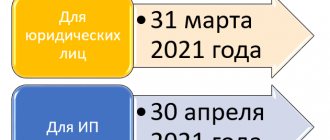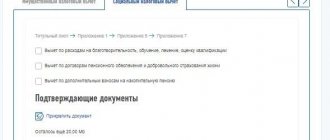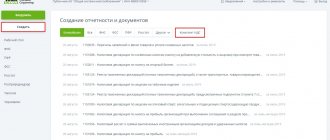What does zero reporting include?
The need to submit zero reporting for individual entrepreneurs is due to the fact that it is on the basis of these documents, drawn up by the entrepreneur himself, that the state, represented by the inspections of the Federal Tax Service (FTS), determines whether he has correctly calculated and paid the tax.
The recipient of zero reporting is the tax office
Entrepreneurs often think that if they have no profit and the base on which the tax is determined is zero, then they have nothing to report. However, it is not.
Zero reporting usually means tax reporting . An entrepreneur must report to the Federal Tax Service on taxes and insurance contributions. And it is also necessary to submit calculations to the Pension Fund (PFR), Social Insurance Fund (SIF), and in some cases, statistical authorities. But these forms have their own specifics, as a result of which there is no need to talk about zero reporting in relation to them:
- An entrepreneur is required to make payments for himself to the Pension Fund and submit reports on them, regardless of the financial result, and the amount of payments for businessmen with an income from zero to 300,000 rubles per year is fixed;
- obligations to make contributions to the Pension Fund and the Social Insurance Fund for hired workers and to report on this are determined solely by the availability of personnel, and if there is none, there is nothing to report on.
In turn, the set of documents that includes the tax reporting of an entrepreneur is determined by the taxation system he applies.
Today, the following tax system options are available to individual entrepreneurs:
- general (OSNO);
- simplified (USN);
- unified tax on imputed income (UTII);
- single agricultural tax (USAT);
- patent.
Zero reporting is usually submitted by individual entrepreneurs to OSNO and simplified tax system
A complete set of reports may include:
- declarations on taxes paid in accordance with the chosen taxation system;
- book of income and expenses.
The income and expense accounting book is filled out by all entrepreneurs, except UTII payers. In 2021, KUDiR can be maintained electronically and does not need to be certified by the tax office. But be prepared to present the KUDiR in printed form at the first request of the tax office. It is not necessary to certify the paper version with the IP seal.
In a narrow sense, tax reporting in general and zero reporting in particular means only documents that are subject to submission to the Federal Tax Service inspection within the prescribed period, that is, tax returns. But it is also necessary to keep a book of income and expenses.
In 2021, entrepreneurs using OSNO and simplified tax systems are recommended to maintain KUDiR
Zero reporting forms
There are no separate forms for zero reporting of individual entrepreneurs in 2021. Most often, a standard declaration form is used for the corresponding type of tax, but the columns allocated to indicate income reflect their absence.
To submit zero reporting, a standard tax return form is used.
However, if the entrepreneur:
- is recognized as a taxpayer for one or more taxes;
- does not carry out operations that result in the movement of funds in his bank accounts (at the organization’s cash desk);
- and has no objects of taxation for these taxes...
... then he can submit a single (simplified) tax return for these taxes.
With the book of income and expenses for those who must fill it out, the situation is similar: it also reflects the lack of income.
The Tax Code of the Russian Federation does not contain the concept of zero reporting at all. And in everyday life, this phrase means a declaration with zero income indicators.
Zero reporting on OSNO
An individual entrepreneur using the general taxation system must submit two documents to the tax office:
- declaration on payment of personal income tax form 3-NDFL;
- value added tax (VAT) declaration.
If the reporting is submitted as zero, only the title page is filled out in both declarations. In section 1, the following are indicated in the appropriate columns OKTMO and KBK: 18210301000011000110 for VAT and 18210102020011000110 for personal income tax. The remaining lines must be filled with dashes.
The VAT return is submitted quarterly by the 25th day of the first month of the new quarter. Form 3-NDFL - once a year until April 30 of the following year.
Zero reporting under simplified tax system
With a simplified taxation system, tax reporting subject to submission to the Federal Tax Service is limited to a single tax declaration in connection with the application of the simplified tax system. It is submitted once a year - until April 30 of the following year.
The procedure for filling out a zero declaration is the same as for individual entrepreneurs on the general system:
- the title page is filled out;
- OKTMO is entered in section 1.1 and the taxpayer attribute and the rate for the object in section 1.2 for those paying 6% of income;
- those paying 15% of the difference between income and expenses indicate OKTMO in section 1.2 and the tax rate in the corresponding paragraphs of section 2.2;
- dashes are placed in all other columns.
Zero reporting for UTII and patent
A feature of these tax regimes is that zero reporting is impossible in principle. After all, the specificity of UTII and patents is that entrepreneurs using these taxation systems transfer UTII or the cost of the patent to the budget, regardless of their financial results.
An individual entrepreneur with a patent does not have to submit any tax returns. His obligations in this regard are limited to timely payment of the cost of the patent and maintaining a ledger of income and expenses. With its help, tax authorities will be able, if necessary, to check whether the income of such an entrepreneur has not exceeded the maximum barrier, after which the right to use the patent is lost.
As for UTII payers, they are required to submit a declaration every quarter before the 20th day of the first month of the next quarter and transfer tax to the budget by the 25th. Including for reporting periods in which they had no profits or did not operate.
Let us emphasize: even if no activity was actually carried out and real income for the period was zero, the single tax is paid based on the potential income received (clause 1 of Article 346.29 of the Tax Code of the Russian Federation). Accordingly, it is impossible to submit a zero declaration and not pay UTII (Letters of the Ministry of Finance dated September 14, 2009 No. 03–11–06/3/233, dated July 2, 2012 No. 03–11–11/196).
Photo gallery: UTII declaration for individual entrepreneurs
Sheet 1 of the UTII declaration is the title page; the full name of the entrepreneur and address are indicated on it
UTII declaration: sheet 2 contains the amount of imputed tax broken down by OKATO codes
UTII declaration: sheet 3 shows the calculation of tax amounts for certain types of activities
UTII declaration: sheet 4 shows the amount of insurance contributions by which the amount of tax payable is reduced
Let's sum it up
- The EUD is a special report submitted only in situations where the taxpayer does not have any economic activity and only in relation to certain taxes. The deadline for its submission comes earlier than the deadline for filing regular returns for those taxes that can be reflected in the EUD.
- The taxpayer does not have the obligation to replace ordinary declarations with zero data with EUD. Therefore, if he fails to submit the EUD on time, he can, without any negative consequences for himself, report on the taxes shown in it, by filing regular declarations on them and submitting them within the deadlines established for filing such declarations.
- If the EUD is submitted after the expiration of the period allotted for its submission, then the taxpayer for failure to submit it on time is punished with a fine of 1,000 rubles, imposed under clause 1 of Art. 119 of the Tax Code of the Russian Federation for failure to submit a tax return.
How and where to submit tax reports
In 2018, the recipient of individual entrepreneurs’ tax returns, including zero ones, remains the Federal Tax Service inspectorate at the entrepreneur’s place of residence.
The place of residence of an individual entrepreneur means the address where he is registered, or, as they say in the old fashioned way, registered. An entrepreneur can actually live and conduct business anywhere, but must send reports to the tax office at his place of registration, even if he has registration at his place of residence somewhere else.
To prepare and submit reports, including zero reports, businessmen often use the services of a specialized organization, which will have to be paid for. Online accounting services (for example, “Elba”, “My Business”, “Deal 24”, etc.) will help you generate declarations, or you can solve this problem entirely on your own.
How to submit zero reporting for individual entrepreneurs yourself
There are three options:
- personally take the documents to the tax office;
- send them there by mail;
- submit via the Internet.
It is necessary to take into account that starting from January 1, 2014, VAT payers (including those who are tax agents) can submit tax returns only electronically via telecommunication channels. The Federal Tax Service has not accepted paper payments for three years now.
When visiting the Federal Tax Service in person, you will need to have a second copy or photocopy of each document submitted. The inspectorate staff will mark them with acceptance.
Instead of an entrepreneur, his authorized representative can submit documents to the Federal Tax Service. To do this, you need to issue a notarized power of attorney for such a person, a copy of which is submitted to the tax office along with the declaration, and reflect the fact of submission of reports by the authorized person in the appropriate section of the title page.
By mail, documents are sent by registered mail with a description of the contents and notification of delivery.
To independently submit documents via the Internet, an entrepreneur will need an electronic digital signature (EDS), which is used to certify each of them, and an individual entrepreneur’s personal account on the government services portal or the website of the Federal Tax Service of Russia.
A “flash drive” with an electronic digital signature relieves entrepreneurs of many problems associated with submitting reports to the Federal Tax Service
Who should report on 4-FSS in 2021?
Typically, reporting submitted to the Federal Tax Service Inspectorate generally refers to all Declarations, calculations, information, the submission of which to the Federal Tax Service Inspectorate is obligatory for taxpayers.
The deadlines for submitting individual declarations and calculations are specified in the relevant chapters of part two of the Tax Code of the Russian Federation. For local and regional taxes, the deadlines set by local and regional authorities must be followed.
Taxpayers are also required to submit financial statements to the Federal Tax Service once a year (no later than three months after the end of the financial year).
The 4-FSS calculation summarizes data on payments made in favor of employees, accrued and paid insurance premiums for accidents and occupational diseases (AS and OPD) that occurred at work. This type of insurance is regulated by the Law “On Compulsory Social Insurance...” dated July 24, 1998 No. 125-FZ.
How to draw up a zero 4-FSS, learn from our material “Sample of filling out a zero calculation of 4-FSS in 2021.”
Insurers are legal entities, including foreign ones, provided they carry out activities in Russia and have Russian citizens on staff, as well as individuals employing citizens who are subject to compulsory insurance against accidents and accidents. Thus, according to paragraph 1 of Art. 24 of Law No. 125-FZ, all enterprises and individual entrepreneurs with employees are required to submit reports in Form 4-FSS.
According to paragraph 1 of Art. 26.29 of Law No. 125-FZ, the fine for late submission of reports is at least 1000 rubles. The fine is also indicated: 5% of the amount of insurance premiums accrued for payment for the last 3 months of the reporting period, for each month of delay (full and/or partial). But the maximum fine cannot exceed 30% of the specified amount.
Let's consider the situation when 4-FSS zero is not submitted on time - what fine does the organization, official and individual entrepreneur face?
If the report contains the amounts of accrued contributions, then the amount of the fine for late submission of the calculation will depend on the length of the delay.
See the algorithm for calculating the fine here.
In the case of a blank report, it becomes obvious that if a zero report is submitted to the Social Insurance Fund late, even one day, or not submitted at all, then this will not affect the amount of the fine. It will be equal to 1000 rubles.
The fine for violating the reporting procedure is 200 rubles.
For late submission of zero reports to 4-FSS, a fine may be imposed on an official in the amount of 300 to 500 rubles - in accordance with clause 2 of Art. 15.33 Code of Administrative Offenses of the Russian Federation.
Even if the payment is not submitted or submitted on time, the fine can be avoided, its size can be reduced, or an installment plan (deferment) in payment can be obtained. Art. talks about this. 26.2 and art. 26.25 of Law No. 125-FZ. To exercise these rights, the policyholder must submit a corresponding application to the territorial branch of the Social Insurance Fund where he is registered. Circumstances that positively influence the outcome of the case may include:
- on an installment plan (deferment), the period of which should not exceed 1 year: the influence of force majeure circumstances, the seasonal nature of the work, untimely payment of budget allocations to the policyholder - the recipient of budget funds;
- to reduce (cancel) the fine: natural disasters, illness of an official, compliance by the insured with the insurer’s instructions.
We invite you to read: Fine for driving without MTPL insurance in 2019 - new rules
Reporting to the Federal Tax Service on insurance premiums
Since an individual entrepreneur is obliged to make contributions to the Pension Fund for himself, and if he has employees, for them, regardless of the financial result of his business activity and the very fact of its implementation, reporting on insurance contributions for pension insurance, by definition, cannot be zero.
If the tax reporting of an individual entrepreneur is zero, this does not affect the procedure for submitting reports on payments to the Pension Fund - it remains the same as for an entrepreneur who has something to write in a tax return.
Individual entrepreneurs are obliged to pay contributions to the Pension Fund and report on this, at least for themselves, even with zero income
A businessman’s obligations to the Social Security Fund are affected only by whether he has employees or not. If they are not there, he does not need to report to the FSS. If there is, the procedure, as in the case of the Pension Fund, is the same as for an individual entrepreneur submitting not zero, but regular tax reporting.
Video: tips for successfully submitting zero reporting on insurance premiums
Blocking an account for late declaration
Another very unpleasant consequence that awaits those who are late with the report is the blocking of the current account. Tax inspectorates resort to this opportunity to complicate the life of the taxpayer quite quickly - after 10 days of delay (clause 3 of Article 76 of the Tax Code of the Russian Federation). However, such a sanction applies only to the main tax returns: profit, simplified tax system, VAT, UTII. And vice versa, delays in filing, for example, the calculation of advance payments for income tax, the financial statements of the Federal Tax Service, the average number of employees, or the calculation of insurance premiums do not lead to blocking. These reports are not declarations in the full sense of the word, and the provisions of Article 76 of the Code do not apply to them. Previously, one could also not expect sanctions other than a fine for the DAM zero, or with the amount of contributions payable to the Pension Fund - the account was not blocked for such delays.
FINE FOR FAILURE TO PROVIDE REPORTING TO THE FSS AND PFR
For failure to submit or for late reporting, the organization is punished by the Pension Fund and the Social Insurance Fund. The sanctions are very similar to those of tax auditors, and there is also no relief for zero reporting.
Minimum fine 1000.00 Maximum fine 5% of the contribution amount
However, funds additionally impose sanctions on officials (director and chief accountant) under Article 15.33 of the Administrative Code. The fine varies from 300 to 1000 rubles.
FOR FAILURE TO PROVIDE REPORTS TO THE FIU FOR THE SECOND TIME THE FINE WILL BE 5,000 RUBLES.
We fundamentally disagree with double fines; the Russian Ministry of Labor shares the same opinion.
It is absolutely not natural to issue a fine for the same violation, but where is the principle of one-time fines? However, there is no judicial practice today, and it is still difficult what local auditors will do. FINES IN THE FSS Calculation form 4-FSS is provided - this report is also divided into two sections Section 1 - Reflects the calculation of social insurance contributions in case of disability (in connection with maternity) Section 2 - Reflects the calculation of social insurance contributions for accidents at work and occupational diseases. As interpreted by the auditors of the Social Insurance Fund, liability arises for each type of contribution, and, accordingly, fines are imposed according to different laws and with different approaches. So for 4-FSS - the fine will be 5% of the amount of contributions
But for Section II, sanctions will be charged 5% if the delay does not exceed 180 calendar days, the restrictions are the same - no more than 30% and no less than 100 rubles.
Zero tax reporting for OSNO
There are a number of taxes that are mandatory for the general regime - VAT, income tax. For these taxes, you will have to file zero returns even if there is no turnover. Zero profit and VAT declarations must include a title page and mandatory sections with dashes (which sections are required for a particular declaration, you can always find out from the instructions for filling it out).
Other taxes (on property, land, water, etc.) are paid only if there is an object. If you don’t have land, then you don’t pay tax and don’t submit any form of declaration. That is, if there are no corresponding taxable objects, a zero declaration is not submitted. The property tax has a zero declaration. It must be submitted if you have taxable objects, but the total tax amount for all of them is zero.
There is a single simplified return that replaces multiple tax returns. It has the right to be drawn up and submitted by those payers who during the reporting period had no movement in the cash register and current account, and also had no objects of taxation (Clause 2 of Article 80 of the Tax Code of the Russian Federation). The deadline for this declaration is until the 20th day of the month following the reporting quarter.
If there has been no activity all year, you need to submit a balance sheet. At a minimum, the amount of the authorized capital in the liability will be indicated and one of the asset lines will be filled in.
The deadlines for submitting zero reports to the tax office are similar to the deadlines for submitting reports for each type of tax.
Penalties for late submission
If the declaration was submitted, but not on time, then sanctions in the form of fines cannot be avoided. The fine for individual entrepreneurs for late submission of a declaration is 5% of the tax that was not paid on time. The Federal Tax Service can prosecute an entrepreneur for this offense within three years.
Attention! What to do when you don’t have time to file your declaration? In this case, the document must be submitted as early as possible, then the fine, although there will be a minimal one. For a few days of late delivery, no more than 100 rubles will accrue. This is not such a large amount, if you remember that the fine for a failed declaration under the simplified tax system for individual entrepreneurs ranges from 1000 rubles.








